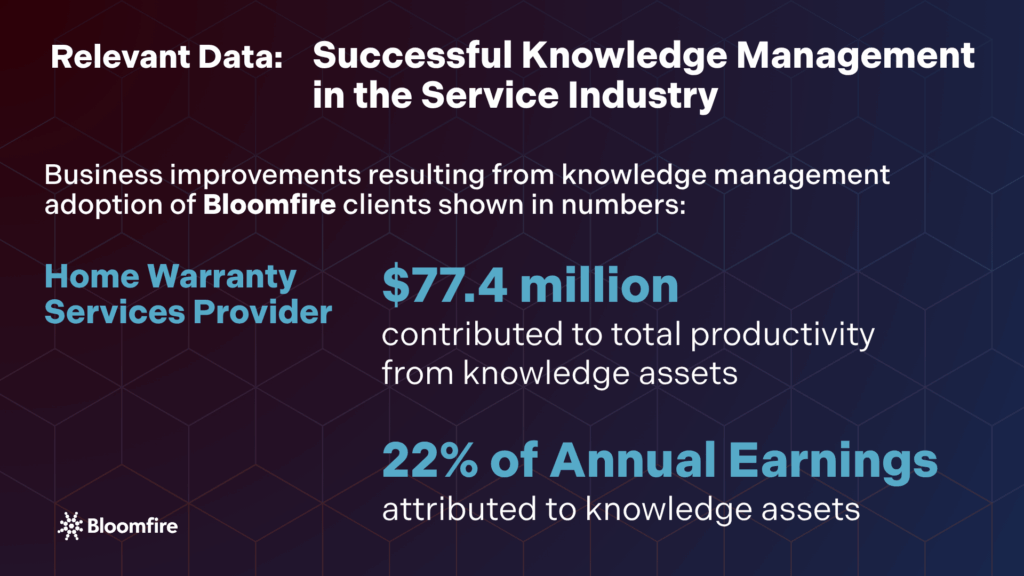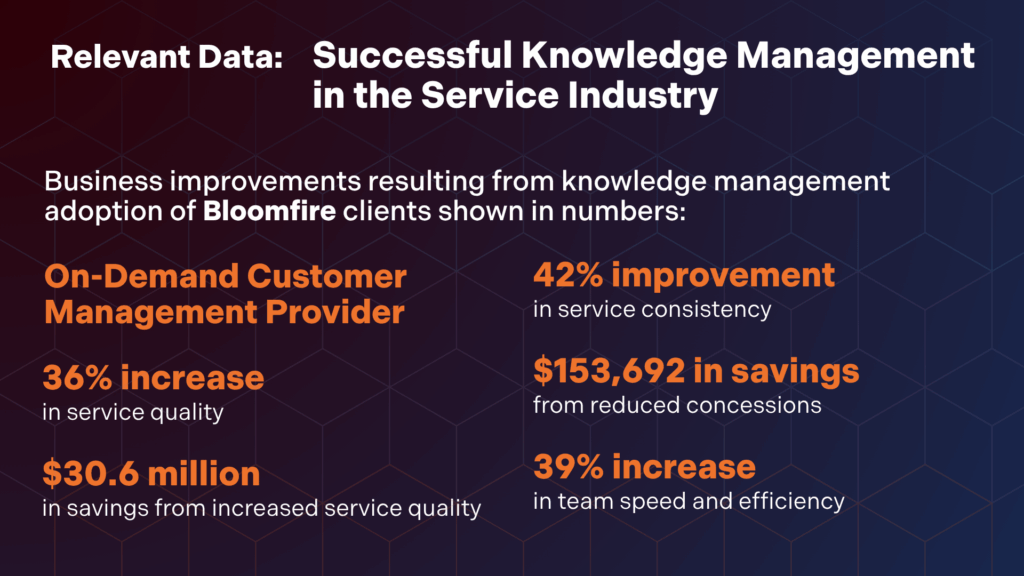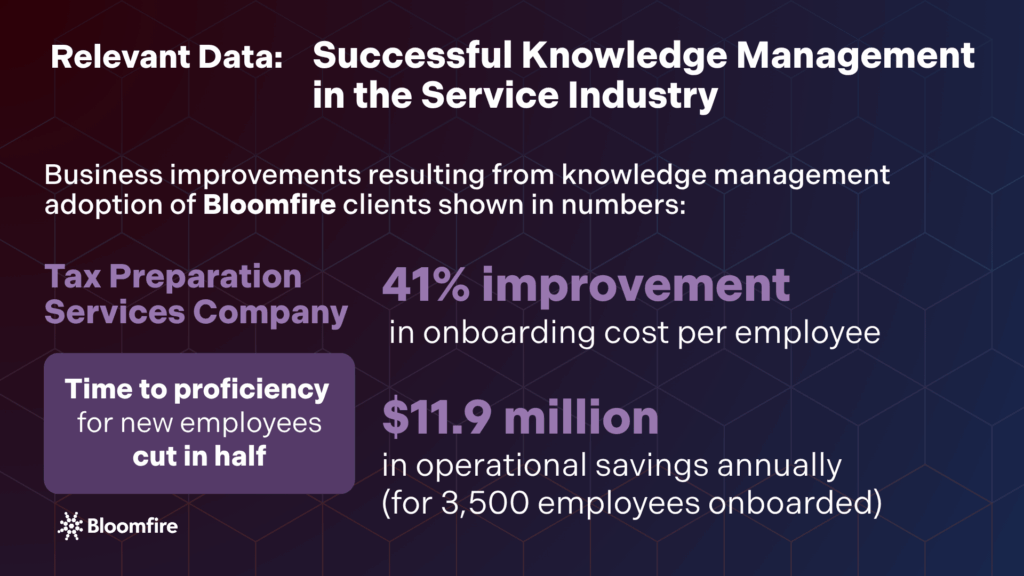The Role of Knowledge Management in the Business Service Industry

What sets an organization apart from its competitors? Most service-based business leaders would likely point to the quality of their services, their ability to innovate, their teams’ expertise, or the speed with which they solve customer challenges. Underlying all these key differentiators is knowledge—and, more importantly, the way it’s managed and shared.
Easy access to organized information serves as the foundation for innovative product development, effective communication, superior customer service, and all the other critical elements for sustained success in the service industry.
Integrating knowledge management into your service operations can be a game-changer. It empowers employees with the right tools and information, and ensures that your organization remains agile and responsive to market changes. Below, we discuss the critical role of knowledge management in the service industry in further detail.
Overview: Knowledge Management in Business Operations of the Service Industry
Businesses are increasingly recognizing the importance of capturing and leveraging knowledge to gain a competitive edge. This is particularly relevant in service-oriented sectors where knowledge is both a product and a process.
Before we take a deeper dive into the role of knowledge management in the service industry, let’s take a step back and specify the types of businesses we’re talking about. As the name suggests, service industry businesses primarily provide services rather than physical goods. These can include direct-to-consumer services, such as travel, hospitality, or entertainment.
However, for the purposes of our discussion, we will focus on organizations that offer business-to-business (B2B) services, such as consulting, accounting, engineering, or supply chain management.
Knowledge management in the business operations of the service industry involves several key components, including knowledge creation, storage, sharing, and application. Establishing structured processes and systems ensures that valuable information is readily accessible to those who need it. This not only streamlines operations but also enhances decision-making and problem-solving capabilities.

How Does Knowledge Management Benefit the Service Industry?
In the service industry, organizations rely on their ability to use and deliver highly specialized knowledge. Without effective KM, service industry professionals can struggle to meet client needs. Here are ways KM can benefit your service-based business:

1. Efficient access to information
A knowledge management platform gives employees one central place to access the information they need to do their jobs and assist clients. This decreases the time they spend searching for resources or trying to track down the right subject matter experts, which translates to more time for impactful activities.
2. Improved training and onboarding
When you have all essential information ready and available for your workforce, it helps speed up onboarding for new hires and ensures all employees feel empowered and supported. Instead of waiting for managers or veteran employees to answer questions, employees can quickly and easily help themselves.
One of our customers, Giltner Logistics, reduced its onboarding time by 50% after implementing a centralized knowledge management platform. The significant improvement allowed them to get new hires up to speed much faster, boosting overall team productivity.
3. Streamlined business processes
With an organization-wide knowledge management strategy and platform, employees can easily access and share valuable information, best practices, and lessons learned, regardless of their location. Because they have visibility into knowledge and content generated across the entire organization, they are less likely to waste time duplicating work that has already been done.
Bloomfire customer Insperity is a great example of a professional service business that has reduced duplicate work and improved team alignment. Additionally, they have reduced the time required to share and update content using a knowledge management platform.
4. Improved customer service
There’s nothing more frustrating for clients than inconsistency and poor customer service. Because some client-facing employees are more skilled and knowledgeable than others, clients’ experiences vary. But when information is readily available to everyone—including processes for handling various questions and concerns—professional service firms can create more consistency.
Whether a team member has been with the company for a few months or a few years, they have access to the same knowledge as the rest of the organization, leading to greater consistency in the client experience. And that’s crucial given that 90% of Americans use customer service as a factor when comparing businesses, according to data from Microsoft.
5. Enhanced innovation
Expertise is the product that professional service businesses offer to their clients. A 2025 LinkedIn Workplace Learning Report found that 94% of organizations are looking to build employee skills to stay competitive in a rapidly changing environment.
By effectively capturing, organizing, and sharing knowledge and expertise across an organization, a knowledge management platform enables employees to leverage a wealth of information and best practices. As a result, teams enhance their ability to generate new ideas and solutions, thereby strengthening the correlation between business success and effective knowledge management.
Employees can also use the platform to share learnings from past experiences. They can even further engage with and build upon the knowledge of their peers, and collaborate across teams to develop new approaches to meet evolving client needs.
6. Cost savings
A good knowledge management strategy and platform will save professional service firms money by reducing time wasted searching for information, eliminating the duplication of existing work, and making it easier for employees to find and reuse existing knowledge.
These cost savings can result in a substantial return on investment (ROI). The average Bloomfire customer sees an ROI of 9:1 based on time savings alone. This demonstrates the immense value a well-implemented knowledge management system brings to an organization.
The Role of Knowledge Management Systems in the Business of Service
A knowledge management system (KMS) is a vital component of business strategy, providing a structured approach to managing information. The role of a KMS in business operations cannot be overstated, as it serves as the backbone for capturing, storing, and disseminating knowledge across the organization.
Implementing a robust KMS enables you to create a centralized platform where information is easily accessible, organized, and searchable. This fosters a culture of knowledge sharing, where employees are encouraged to contribute and collaborate. As a result, you can enhance productivity, drive innovation, and improve decision-making processes.
Moreover, a KMS supports scalability and adaptability, allowing your business to respond effectively to changing market demands. Leveraging insights from a well-managed knowledge base, you can make informed strategic decisions, optimize service delivery, and ultimately achieve a competitive edge in the marketplace.
How to Set Your Knowledge Management Program Up for Success
Knowledge management offers a wide range of benefits, but when it comes to achieving success, you can’t rely on technology alone—you also need to develop the right KM strategy. Here are four steps to setting up a knowledge management program for service-based organizations:
Step 1: Make a strong business case
You need the support of your Chief Financial Officer (and other members of the C-suite) if you’re planning to invest in a knowledge management program and the technology to support it. That means you’ll need to put together a strong business case, including what you expect the program to achieve, your plan for implementing it, and how you’ll measure results. Including an ROI estimate can also help you secure the necessary buy-in.
Step 2: Get cross-functional buy-in
Effective KM supports the entire company and helps everyone achieve their objectives. But to ensure your knowledge management platform drives a positive ROI, you need to make sure every team is on board, which means getting buy-in from department heads. Make the case early and choose a few leaders to act as internal KM champions.
Step 3: Reward knowledge sharing
Knowledge sharing should be a team sport. Encourage all employees to get involved in building and optimizing the KM experience by adding relevant data and information. Consider rewarding top contributors with recognition, bonuses, or other incentives.
Step 4: Empower employees to work autonomously
Instead of having employees rely on managers and peers for information on a case-by-case basis, drive them to your knowledge management platform to publish their questions. This way, anyone with similar concerns can find the same answers. By cultivating discussions and creating a place that houses all the knowledge employees need, they’ll be able to work independently and collaboratively without constant hand-holding or oversight.
When it comes to meeting business goals, KM is important, and knowledge management in the service industry is downright vital. By investing the time and resources to create an effective KM strategy and adopting the right technology, you can set your business up for sustainable success.
Case Studies: Successful Knowledge Management in the Service Industry
Several organizations within the service industry have successfully leveraged knowledge management systems to drive significant improvements across various aspects of their operations. These successes are not merely anecdotal; they are quantifiable outcomes that underscore the strategic importance of effective knowledge utilization.
The following compelling data, drawn from Bloomfire’s Value of Enterprise Intelligence Report, showcases the tangible benefits achieved by service providers through robust knowledge management practices, including enhanced productivity, substantial cost avoidance, and drastically reduced onboarding times.
Home Warranty Services Provider
Effective use of knowledge assets contributed $77.4 million (22% of Annual Earnings) to total productivity in a home warranty solutions provider that uses Bloomfire. This highlights how knowledge management directly impacts revenue generation and overall business performance in service-oriented companies.

On-Demand Customer Management Provider
In customer management, knowledge management has driven substantial cost avoidance and operational improvements. A 36% increase in service quality translated into $30.6 million in savings, equivalent to the output of 266 agents, by empowering them to deliver better service and reduce the need for extensive support.
Furthermore, a 42% improvement in service consistency led to $153,692 in savings through reduced concessions, as readily available knowledge minimized errors and customer dissatisfaction.
A 39% increase in team speed and efficiency yielded $33.2 million in savings, equivalent to 290 agents, demonstrating how rapid access to information and standardized processes significantly enhance team productivity and reduce operational expenses. Accounting for some overlap, the total impact of these improvements was a remarkable $41.7 million.

Tax Preparation Services Company
For a tax preparation services company, implementing a knowledge management solution like Bloomfire significantly impacted their operational efficiency and cost savings. The time to proficiency for new employees was cut in half, demonstrating how readily available, structured knowledge accelerates the onboarding process and gets new service professionals up to speed much faster.
The impact also translated to substantial financial benefits: the operational cost of onboarding per employee decreased from $5,744 to $2,348, a 41% improvement. For the 3,500 employees onboarded annually, this reduction translated into $11.9 million in operational savings, powerfully showcasing the direct financial advantages of knowledge management in streamlining training and reducing expenses tied to new hires in service industries.
Examining real-world examples of successful knowledge management in the service industry can provide valuable insights and inspiration. Companies that have effectively implemented KM strategies often report significant improvements in service delivery, customer satisfaction, and operational efficiency.

Frequently Asked Questions
What is the role of knowledge management in a service-based economy?
In a service-based economy, knowledge management is crucial for organizations to effectively create, share, and apply expertise, directly impacting their core offerings. It ensures that valuable information, from best practices to customer insights, is readily accessible, empowering employees to deliver consistent and high-quality service.
How can organizations improve knowledge management in the manufacturing and service industries?
Organizations in both manufacturing and service industries can significantly improve knowledge management by fostering a culture of knowledge sharing, where employees are encouraged and incentivized to contribute their expertise. Implementing centralized, easily accessible, and regularly updated knowledge repositories, such as digital knowledge bases or wikis, is crucial for ensuring that all critical information is readily available.
Finally, leveraging technology like AI-powered search, analytics, and collaboration tools can further streamline knowledge capture, dissemination, and application, leading to enhanced efficiency, innovation, and decision-making across the board.
What are knowledge management services in business?
Knowledge management services in business involve the systematic processes and strategies for identifying, capturing, organizing, storing, and disseminating an organization’s collective information and expertise. These services aim to make critical knowledge easily accessible to employees, customers, and partners when and where it’s needed.
Elevate Business Performance through Knowledge Management
For businesses looking to elevate their performance, embracing knowledge management is not just an option—it’s a necessity. You can drive efficiency, foster innovation, and improve customer satisfaction through systematically capturing and leveraging knowledge. Investing in a robust knowledge management system and fostering a culture of collaboration will empower your organization to thrive in a competitive landscape.
This post was originally published in June 2021. It was most recently updated and expanded in July 2025.
Empower Your Service Teams
Access instant answers, drive better results. Invest in knowledge management.
Request a Demo

10 Best Knowledge Management Practices in 2026

Different Types of Knowledge: Implicit, Tacit, and Explicit

Striking the Right Balance Between AI and Human Customer Service

Estimate the Value of Your Knowledge Assets
Use this calculator to see how enterprise intelligence can impact your bottom line. Choose areas of focus, and see tailored calculations that will give you a tangible ROI.

Take a self guided Tour
See Bloomfire in action across several potential configurations. Imagine the potential of your team when they stop searching and start finding critical knowledge.